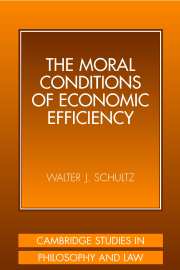Book contents
- Frontmatter
- Contents
- Preface and Acknowledgments
- The Moral Conditions of Economic Efficiency
- 1 Introduction and Synopsis
- 2 A Contextualized Proof of the First Fundamental Theorem of Welfare Economics
- 3 The Moral Thesis: Moral Normative Constraints Are Necessary Conditions of Pareto-Optimal Equilibrium Allocations of Commodities Achieved through Market Interaction
- 4 A Spontaneous Order Objection
- 5 The Roles of Moral Normative Constraints in Relation to Externalities
- 6 The Moral Conditions of Economic Efficiency
- 7 Implications
- Notes
- Bibliography
- Index
3 - The Moral Thesis: Moral Normative Constraints Are Necessary Conditions of Pareto-Optimal Equilibrium Allocations of Commodities Achieved through Market Interaction
Published online by Cambridge University Press: 23 November 2009
- Frontmatter
- Contents
- Preface and Acknowledgments
- The Moral Conditions of Economic Efficiency
- 1 Introduction and Synopsis
- 2 A Contextualized Proof of the First Fundamental Theorem of Welfare Economics
- 3 The Moral Thesis: Moral Normative Constraints Are Necessary Conditions of Pareto-Optimal Equilibrium Allocations of Commodities Achieved through Market Interaction
- 4 A Spontaneous Order Objection
- 5 The Roles of Moral Normative Constraints in Relation to Externalities
- 6 The Moral Conditions of Economic Efficiency
- 7 Implications
- Notes
- Bibliography
- Index
Summary
Chapters 3 through 6 are dedicated to answering the first central question:
Can a population of strict rational egoists achieve efficient allocations of commodities through market interaction in the absence of moral normative constraints?
In this chapter, I argue for a Moral Thesis regarding economic efficiency:
Moral normative constraints are necessary conditions of Pareto-optimal equilibrium allocations of commodities achieved through market interaction.
Pareto-optimal allocations of goods require moral normative constraints because these outcomes of market interaction require perfect competition, and moral normative constraints are necessary for perfect competition. More technically, a proof of the First Fundamental Theorem of Welfare Economics establishes that efficient allocations of goods depend on every individual maximizing utility competitively. By definition, an agent maximizes utility competitively if and only if she attempts to obtain that consumption bundle within her budget constraint such that no other bundle is more preferred, and price-taking is the best course of action to achieve her goal. Therefore, the validity of the theorem depends on competitive behavior, and competitive behavior is secured by moral normative constraints.
I will treat the terms price-taking behavior, competitive behavior, and market behavior synonymously. Price-taking is a type of market action defined partially by an agent's belief that she cannot affect price levels. She makes her trading decisions entirely based on announced prices. All behavior that leads to inefficiency I refer to as noncompetitive or nonmarket behavior. I use the terms force (theft) and fraud to differentiate two broad classes of noncompetitive behavior.
- Type
- Chapter
- Information
- The Moral Conditions of Economic Efficiency , pp. 33 - 57Publisher: Cambridge University PressPrint publication year: 2001



